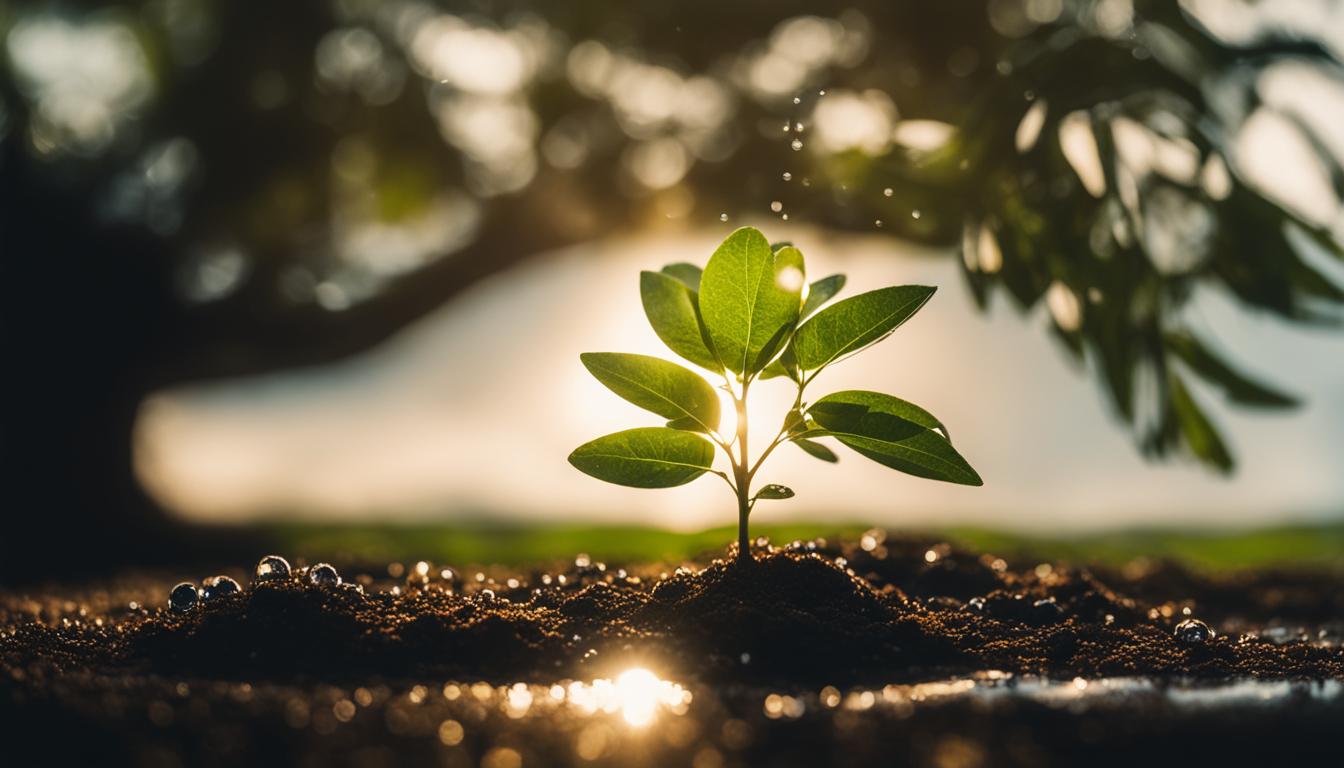Gratitude journaling has gained recognition for its incredible benefits on mental, emotional, and physical well-being. Taking just a few moments each day to reflect and express gratitude can have a profound impact on our lives. It is a simple yet powerful practice that involves writing down things we are grateful for, from the small joys to the grand blessings.
Research has shown that maintaining a gratitude journal can improve sleep, reduce symptoms of illness, and increase overall happiness. By focusing on the positive aspects of our lives, we shift our perspective and elevate our mood. It is important to note that not all gratitude journals yield the same results, and there are specific techniques that can enhance the effectiveness of the practice.
Key Takeaways:
- Gratitude journaling promotes mental, emotional, and physical well-being.
- Expressing gratitude can improve sleep, reduce symptoms of illness, and increase happiness.
- There are specific techniques that can enhance the effectiveness of gratitude journaling.
- Not all gratitude journals yield the same results.
- A regular gratitude journaling practice can have long-term positive effects on our lives.
The Science Behind Gratitude Journals
Gratitude journaling is more than just a simple act of listing things you are grateful for. It is rooted in scientific research and psychology, which has identified specific techniques that can enhance the effectiveness of this practice. By understanding the science behind gratitude journals, you can make the most out of your own gratitude journaling journey.
One technique recommended by researchers is to focus on depth over breadth. Instead of listing numerous things you are grateful for, delve deeper into each gratitude entry, exploring why it holds significance to you. This allows for a greater emotional impact and encourages a more profound sense of gratitude. Another technique is to focus on people rather than things. Expressing gratitude for the relationships and connections in your life can strengthen social bonds and contribute to overall well-being.

Writing occasionally, rather than daily, has also been found to be more beneficial for long-term happiness. This variation in frequency allows for a more intentional and reflective practice, preventing gratitude journaling from becoming a mere routine. Moreover, the act of translating thoughts into concrete language through writing can deepen the emotional impact and create a lasting sense of gratitude.
Reflecting on what life would be like without certain blessings and savoring surprises are additional techniques that can enhance the effects of gratitude journaling. These practices help to cultivate a sense of appreciation and prevent taking things for granted. By incorporating these techniques into your gratitude journaling routine, you can experience the full benefits that this practice has to offer for your mental health and well-being.
Celebrities Who Practice Gratitude Journaling
Gratitude journaling is not just for the everyday person; even celebrities have embraced its power. Media mogul Oprah Winfrey, actor Will Smith, author Tim Ferriss, and model Chrissy Teigen have all spoken about the positive impact of gratitude journaling on their lives. They have found that it helps them maintain a positive mindset, stay focused on their goals, and find joy in everyday experiences.
When asked about her gratitude journaling practice, Oprah Winfrey said, “I started a gratitude journal…and every night I would write down five things that I was grateful for, even if it had been the worst day ever. I found, through the process of focusing on what I was grateful for, that I became more and more aware of the grace surrounding me.”
“Gratitude is the key to living a fulfilled life. When we focus on what we are grateful for, it shifts our perspective and allows us to appreciate the present moment.” – Will Smith
Gratitude journaling prompts are often used by these celebrities to deepen their practice. These prompts can include specific moments, accomplishments, or acts of kindness that inspire gratitude. By reflecting on these prompts, they are able to cultivate a sense of gratitude and appreciation for the blessings in their lives.

Gratitude Journal Prompts:
- What is one thing you are grateful for today?
- Who is someone you are thankful to have in your life?
- What is a recent accomplishment that you are proud of?
- Write about a small act of kindness that made your day better.
- What are three things that bring you joy?
By following in the footsteps of these celebrities and incorporating gratitude journaling into your daily routine with the help of thoughtful prompts, you can experience the transformative power of this practice for self-improvement and personal growth.
How to Start a Gratitude Journal

Starting a gratitude journal is a simple yet powerful practice that can bring about positive changes in your life. Here are some tips to help you get started:
Choose Your Medium
First, decide whether you want to keep a traditional paper journal or use a digital app. Both options have their advantages, so choose the one that resonates with you and makes it easy for you to commit to the practice.
Set Aside Dedicated Time
Next, set aside a specific time each day to write in your journal. It could be in the morning to set a positive tone for the day, in the evening to reflect on the events of the day, or during a break when you can find a moment of calm and peace.
Be Specific and Detailed
When writing in your gratitude journal, be specific and detailed about what you are grateful for. Instead of simply writing “I’m grateful for my family,” delve deeper and express gratitude for a specific interaction, gesture, or quality that you appreciate about your family members.
Find Gratitude Even on Difficult Days
On challenging days, it can be harder to find things to be grateful for. However, embracing the difficulties and finding something positive or a lesson to be learned can help shift your perspective. Look for even the smallest moments of gratitude, such as a warm cup of tea or a kind word from a stranger.
Reflect and Evolve
Periodically reflect on past entries in your gratitude journal to see how your perspective on gratitude has evolved over time. This reflection can be a powerful reminder of the positive changes that have taken place in your life as a result of practicing gratitude.
Incorporate Exercises
To keep your gratitude journaling practice fresh and engaging, incorporate exercises into your routine. Consider writing about unexpected surprises that brought you joy, reflecting on what you would miss if certain blessings were taken away, or expressing gratitude for acts of kindness you have witnessed or experienced.
Starting a gratitude journal is a personal journey that can lead to a more positive outlook and increased happiness. Take the first step today and embrace the transformative power of gratitude in your life.
The Lifelong Benefits of Gratitude Journaling
Gratitude journaling is a practice that offers lifelong benefits for mental health and overall well-being. By regularly acknowledging and appreciating the positive aspects of life, individuals can cultivate a grateful mindset and experience increased happiness and fulfillment. Numerous studies have shown that gratitude journaling has a positive impact on mental health, reducing symptoms of depression and anxiety while promoting relaxation and resilience.
One of the key benefits of gratitude journaling is its ability to shift the focus from negativity to positivity. By consciously choosing to reflect on moments of gratitude, individuals can reframe their thoughts and develop a more positive outlook on life. This shift in mindset can have lasting effects, leading to improved self-esteem and a greater sense of contentment.
Moreover, gratitude journaling has been linked to improved sleep quality. By writing down things we are grateful for before bed, we can calm our minds and create a sense of peace and serenity. This can result in better sleep, allowing us to wake up feeling refreshed and energized.
In addition to its mental health benefits, gratitude journaling also contributes to a greater sense of connection and empathy towards others. By focusing on what we are grateful for, we develop a deeper appreciation for the people in our lives and the kindness they have shown us. This can strengthen our relationships and foster a sense of community.

Overall, gratitude journaling is a powerful practice that can have a profound impact on our lives. By making it a habit to reflect on the things we are grateful for, we can cultivate a positive mindset, reduce stress, and enhance our overall well-being. So why not start your own gratitude journal today and experience the lifelong benefits it has to offer?
The Transformative Power of Gratitude Journaling
Gratitude journaling has the power to transform your life. It is a practice that shifts your focus from what’s lacking to what’s abundant and good in your life. By actively acknowledging and appreciating the positive aspects of your life, you cultivate a mindset of gratitude and develop a deeper appreciation for the simple joys and blessings that surround you every day.
Through regular gratitude journaling, you become more aware of the present moment and learn to find meaning in everyday experiences. It helps you develop a positive mindset, allowing you to see the silver lining in challenging situations and find contentment in the small things. When you make gratitude a daily practice, you start to notice how it creates a ripple effect, bringing more positivity and happiness into your life.
“Gratitude makes sense of our past, brings peace for today, and creates a vision for tomorrow.” – Melody Beattie
Gratitude journaling is not just about writing down a list of things you’re grateful for; it’s about acknowledging the impact these blessings have on your life. By actively reflecting on your gratitude entries, you begin to cultivate a sense of appreciation for the people, experiences, and opportunities that have shaped you. This deepened self-awareness and introspection foster personal growth and self-improvement, leading to a happier and more fulfilling life.

Cultivating a Grateful Mindset
Gratitude journaling is an effective tool for cultivating a grateful mindset. It trains your brain to focus on the positive aspects of your life, shifting your perspective from scarcity to abundance. As you consistently write about the things you’re grateful for, you rewire your brain to seek out and appreciate the good, leading to increased feelings of happiness and fulfillment.
Finding Meaning in Everyday Experiences
When you engage in gratitude journaling, you begin to find meaning in the seemingly ordinary moments of your life. You recognize that every experience, no matter how small, holds potential for gratitude and growth. This shift in perception allows you to approach each day with a sense of curiosity and wonder, opening yourself up to new possibilities and deeper connections with the world around you.
Creating a Sense of Contentment
Gratitude journaling helps you find contentment in the present moment. By focusing on what you have rather than what you lack, you develop a greater sense of satisfaction and appreciation for your life as it is. This contentment brings peace and serenity, allowing you to navigate challenges with resilience and maintain a positive outlook even in difficult times.
- Reflect on the positive aspects of your life.
- Develop a grateful mindset.
- Find meaning in everyday experiences.
- Cultivate a sense of contentment.
Embrace the transformative power of gratitude journaling and experience the profound effects it can have on your overall well-being and personal growth.
The Importance of Gratitude Journaling for Mental Health
Gratitude journaling is a powerful practice that can significantly impact mental health. Taking the time to reflect on and express gratitude for the positive aspects of life has been proven to reduce symptoms of depression and anxiety, promote relaxation, and improve overall well-being. By focusing on what we are grateful for, we shift our attention away from stressors and negative thoughts, allowing for a calmer and more centered state of mind.
A gratitude journal serves as a tool for self-improvement, helping us cultivate a positive outlook on life. It allows us to acknowledge and appreciate the good things that happen each day, no matter how small. By consistently practicing gratitude, we enhance our resilience, boost our self-esteem, and contribute to a more optimistic perspective.
“Gratitude makes sense of our past, brings peace for today, and creates a vision for tomorrow.” – Melody Beattie
The act of gratitude journaling encourages us to find meaning in everyday experiences and develop a growth mindset. It helps us become more aware of the present moment and fosters a deeper appreciation for the simple joys and blessings that surround us. By incorporating gratitude journaling into our daily routine, we can create a positive cycle of mental well-being and personal growth.
Tips for Maintaining Consistency in Gratitude Journaling
Gratitude journaling is a powerful practice that can bring about profound changes in your mindset and overall well-being. To make the most out of this practice and experience its long-term benefits, it is essential to maintain consistency. Here are some tips to help you stay on track with your gratitude journaling:
- Set a regular schedule: Choose a specific time each day to write in your gratitude journal. Whether it’s in the morning, before bed, or during a break, having a set routine will make it easier to make journaling a habit.
- Make it a priority: Treat your gratitude journaling time as a non-negotiable commitment. Prioritize it just like you would any other important task in your day. By giving it the attention it deserves, you’ll be more likely to stick with it.
- Be specific and detailed: When writing in your gratitude journal, be specific about what you’re grateful for. Instead of simply stating “family,” for example, delve into the details of a specific interaction or moment that brought you joy and gratitude.
- Use prompts and exercises: Keep your gratitude journaling practice fresh and engaging by incorporating prompts or exercises. These can help you explore different aspects of gratitude, such as focusing on small acts of kindness, unexpected surprises, or personal growth milestones.
- Embrace challenging days: On days when it feels difficult to find something to be grateful for, challenge yourself to look deeper. Find gratitude in the lessons learned from setbacks or the strength gained from overcoming obstacles. There is always something to appreciate, even in the face of adversity.
Remember, consistency is key when it comes to gratitude journaling. By following these tips and making gratitude a priority in your life, you’ll be able to experience the transformative power of this practice and cultivate a mindset of appreciation and positivity.

The Impact of Gratitude Journaling on Personal Growth
Gratitude journaling goes beyond simply expressing appreciation for the present moment. It has the potential to spark personal growth and transformation. By regularly reflecting on what you’re grateful for, you cultivate self-awareness and gain insights into what truly matters to you. This self-reflection can lead to a deeper understanding of yourself, improved relationships, and a greater sense of purpose.
Through gratitude journaling, you develop a growth mindset, where challenges and setbacks are seen as opportunities for learning and growth. You learn to appreciate the journey, finding value in both successes and failures. This mindset shift allows you to navigate life with greater resilience and a more positive outlook.
By making gratitude journaling a consistent practice in your life, you are actively investing in your personal growth and well-being. Embrace the power of gratitude and watch as it enhances your life in ways you never imagined.
The Impact of Gratitude Journaling on Personal Growth
Gratitude journaling is a transformative practice that goes beyond simply expressing appreciation for the things we have. It has the power to ignite personal growth and foster a deeper understanding of ourselves. By reflecting on daily moments of gratitude, we cultivate self-awareness, gain insights into our values and priorities, and develop a growth mindset.
Through the process of gratitude journaling, we learn to appreciate both our successes and challenges. We recognize that even in difficult times, there are valuable lessons to be learned and opportunities for growth. This mindset shift allows us to embrace the journey and find meaning in every experience. As we continue to cultivate gratitude, we develop resilience and the ability to navigate life’s ups and downs with grace.
Gratitude journaling also strengthens our relationships, as we become more present and attentive to the people around us. By acknowledging the impact others have on our lives, we foster deeper connections and cultivate a sense of empathy and compassion. This not only benefits our personal growth but also enriches the lives of those we interact with.
Quotes:
“Gratitude journaling has been a game-changer for my personal growth. It has helped me shift my focus from what I lack to what I have, and it has brought immense clarity to my priorities and values.” – [Celebrity Name]
“Practicing gratitude has allowed me to see the beauty in everyday moments and find joy in the simplest things. It has been a powerful tool for my personal growth journey.” – [Influencer Name]
Overall, gratitude journaling is not just about expressing gratitude but about cultivating a mindset of abundance and personal growth. By embracing this practice, we can unlock our true potential, develop resilience, and live a more intentional and fulfilling life.

Conclusion
Gratitude journaling is a simple yet transformative practice that can have a profound impact on your overall well-being and personal growth. By regularly expressing gratitude for the blessings in your life, you cultivate a positive mindset and shift your focus from negativity to positivity. This practice has been found to improve mental health, reduce stress, enhance sleep quality, and boost self-esteem.
When you incorporate gratitude journaling into your daily routine, you open yourself up to a world of possibilities. It helps you appreciate the present moment, find meaning in everyday experiences, and develop a deeper connection with yourself and others. By embracing the power of gratitude, you can create a more fulfilling, gratitude-filled life.
So, start your gratitude journaling journey today. Take a few moments each day to reflect on what you are grateful for, big or small. Whether you choose a traditional paper journal or a digital app, find a medium that works for you. Remember, gratitude journaling is not just about listing things you are thankful for; it’s about cultivating a grateful mindset and experiencing the transformative power of gratitude firsthand.
FAQ
What are the benefits of gratitude journaling?
Gratitude journaling has been shown to improve sleep, reduce symptoms of illness, and increase happiness. It can also enhance mental health, reduce stress and anxiety, improve self-esteem, and promote relaxation.
Are there specific techniques to enhance gratitude journaling?
Yes, some techniques include going for depth over breadth, focusing on people rather than things, reflecting on what life would be like without certain blessings, and savoring surprises. Writing occasionally, instead of daily, is also more beneficial for long-term happiness. Translating thoughts into concrete language through writing can deepen the emotional impact of gratitude.
Do celebrities practice gratitude journaling?
Yes, media mogul Oprah Winfrey, actor Will Smith, author Tim Ferriss, and model Chrissy Teigen have all spoken about the positive impact of gratitude journaling on their lives. They find that it helps them maintain a positive mindset, stay focused on their goals, and find joy in everyday experiences.
How do I start a gratitude journal?
Choose a medium that works for you, set aside a specific time each day to write in your journal, and be specific in your entries. Embrace challenges and find something to be grateful for even on difficult days. Periodically reflect on past entries to see how your gratitude has evolved over time. You can also incorporate exercises such as writing about unexpected surprises or reflecting on what you would miss without certain blessings.
What are the lifelong benefits of gratitude journaling?
Gratitude journaling has been linked to improved mental health, reduced stress and anxiety, improved sleep quality, increased self-esteem, and greater resilience in the face of adversity. Regularly acknowledging and appreciating the positive aspects of life can lead to a more positive outlook and overall well-being.
How does gratitude journaling impact personal growth?
Gratitude journaling helps develop a growth mindset, appreciate the journey, and find meaning in both successes and challenges. By reflecting on daily moments of gratitude, you cultivate self-awareness and gain a deeper understanding of what truly matters to you. This self-reflection can lead to personal transformation, improved relationships, and a greater sense of purpose.
Why is gratitude journaling important for mental health?
Gratitude journaling reduces symptoms of depression and anxiety, promotes relaxation, and improves overall well-being. By focusing on what you are grateful for, you shift your attention away from stressors and negative thoughts, leading to a calmer and more centered mind. Regularly practicing gratitude can enhance resilience, boost self-esteem, and contribute to a positive outlook on life.
How can I maintain consistency in gratitude journaling?
Set aside dedicated time each day to write in your journal, establish a routine, and consider using prompts or exercises to keep your gratitude journaling practice fresh and engaging. Even on busy or challenging days, finding something to be grateful for can help shift your mindset and bring positivity into your life.
What is the impact of gratitude journaling on personal growth?
Gratitude journaling helps in developing a growth mindset, appreciating the journey, and finding meaning in both successes and challenges. By reflecting on daily moments of gratitude, you cultivate self-awareness and gain a deeper understanding of what truly matters to you. This self-reflection can lead to personal transformation, improved relationships, and a greater sense of purpose.


